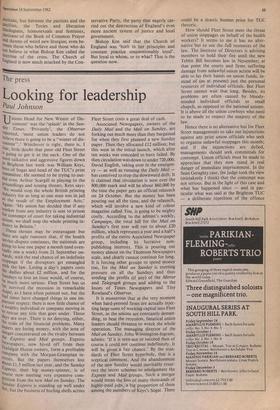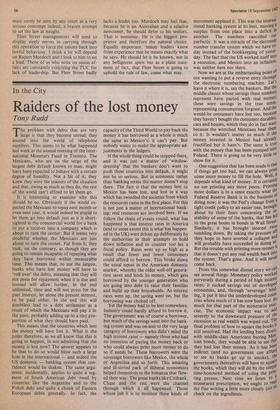The press
Looking for leadership
Paul Johnson
Unions Head for New Winter of Dis- content' was the 'splash' in the Sun- day Times. 'Privately' , the Observer reported, 'most union leaders do not believe there is going to be a "winter of dis- content": Whichever is right, there is, I fear, little doubt that poor old Fleet Street Is going to get it in the neck. One of the Most talkative and aggressive figures down at Brighton last week was William Keys, boss of Sogat and head of the TUC's print committee. He seemed to be trying to out- bid even Arthur Scargill in playing to the l'oundlings and issuing threats. Keys says: We would stop the whole British printing industry for as long as one man was in jail as the result of the Employment Acts.' Again: 'My union has decided that if any worker from any industry is sent to prison for contempt of court for taking industrial action, we shall stop the whole printing in- dustry in Britain.'
These threats may be extravagant but there are ugly rumours that, if the health service dispute continues, the nationals are g°ing to lose one paper a month (and even- tually one a week) from 21 September on- wards, with the real chance of an indefinite st°PPage if the disruptors get entangled With the law. Losing a day's papers costs the dailies about £2 million, and for the Sundays to lose an issue would, of course, be much more serious. Fleet Street has so far survived the recession in remarkable shape, as I have often pointed out, but the bad times have changed things in one im- portant respect: there is now little chance of a wealthy individual or company moving in to rescue any title that goes under. Those days are over. There is no denying, either, the scale of the financial problems. Many Papers are losing money, with the area of he concentrated on the rivalry between Newspapers, Express and Mail groups. Express 1,ewspapers, now hived off from their Trafalgar House owners, form a profitable • 1:2411Pany with the Morgan-Grampian in- terests. But the papers themselves lost about 1.5 million last year, and the Sunday Express, their big money-spinner, is of course now meeting very expensive corn- Petition from the new Mail on Sunday. The fire, Express is standing up well under
"re, but the business of hurling shells across Fleet Street costs a great deal of cash.
Associated Newspapers, owners of the Daily Mail and the Mail on Sunday, are forking out much more than they bargained for when they first planned a new Sunday paper. Then they allocated £12 million; but this went in the initial launch, which after ten weeks was conceded to have failed. By then circulation was down to under 720,000. David English, taking over in the emergen- cy — as well as running the Daily Mail has contrived to stop the downward drift. It is claimed that circulation is now over the 800,000 mark and will be about 860,000 by the time the paper gets an official relaunch on 24 October. But the money has been pouring out all the time, and the relaunch, which will involve a new kind of colour magazine called You, is going to be mighty costly. According to the adman's weekly, Campaign, the total bill for the Mail on Sunday's first year will run to about £20 million, which represents a year and a half's profits of the entire Associated Newspaper group, including its lucrative non- publishing interests. This is pouring out money almost on the Thomson Newspapers scale, and clearly cannot continue for long. It is forcing other groups to spend money too, for the Mail on Sunday is exerting pressure on all the Sundays and thus eroding the profits (if any) of the Mirror and Telegraph groups and adding to the losses of Times Newspapers and Tiny Rowland's Observer.
It is monstrous that at the very moment when hard-pressed firms are actually injec- ting large sums of working capital into Fleet Street, as the unions are constantly deman- ding, to beat the recession, fanatical union leaders should threaten to wreck the whole operation. The managing director of the Mail on Sunday, John Winnington-Ingram, admits: 'If it is seen not to succeed then of course it could not continue indefinitely. It will be given a fair chance.' By the stan- dards of Fleet Street hyperbole, that is a sceptical comment. And the abandonment of the new Sunday would inevitably resur- rect the secret schemes to amalgamate the Express and Mail groups. Such a merger would mean the loss of many thousands of highly-paid jobs, a big proportion of them among the members of Keys's Sogat. There could be a drastic human price for TUC rhetoric.
How should Fleet Street meet the threat of union stoppages on behalf of the health workers? It seems to me it has no alter- native but to use the full resources of the law. The Institute of Directors is advising members to hold their fire until the new Tebbit Bill becomes law in November; at that point the courts and firms suffering damage from unlawful union action will be able to lay their hands on union funds, in- stead of (as at present) just the personal resources of individual officials. But Fleet Street cannot wait that long. Besides, its problems are often caused by bloody- minded individual officials or small chapels, as opposed to the national unions. It is above all the union cowboys who need to be made to respect the majesty of the law.
Hence there is no alternative but for Fleet Street managements to take out injunctions against any print union officials who seek to organise unlawful stoppages this month; and if the injunctions are defied, managements should seek committals for contempt. Union officials must be made to appreciate that they now stand in real danger of immediate imprisonment. In the Sean Geraghty case, the judge took the view (mistakenly I think) that the contempt was not serious. But in the light of this case and what has happened since — and in par- ticular what was said at the Brighton TUC — a deliberate repetition of the offence must surely be seen by any court as a very serious contempt indeed, a brazen attempt to set the law at naught.
Fleet Street managements will need to display steely nerves in carrying through this operation to force the unions back into lawful behaviour. I think a lot will depend on Rupert Murdoch and I look to him to set a lead. Those of us who write on union af- fairs are constantly criticising the TUC for lack of leadership. But Fleet Street badly lacks a leader too. Murdoch may feel that, because he is an Australian and a relative newcomer, he should defer to his seniors. That is nonsense. He is the biggest pro- prietor and therefore the natural choice. Equally important, union leaders know from experience that he means exactly what he says. He should let it be known, not in any belligerent spirit but as a plain state- ment of fact, that Fleet Street is going to uphold the rule of law, come what may.



































 Previous page
Previous page